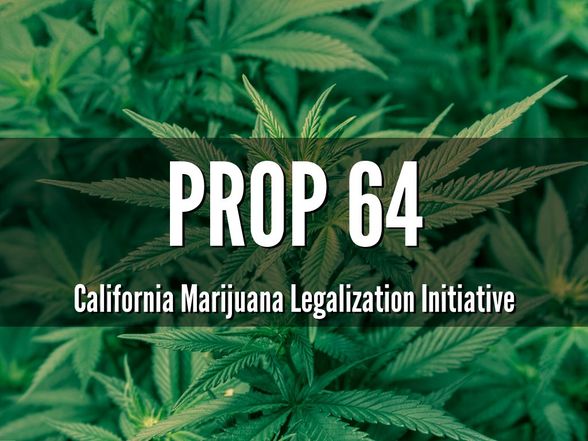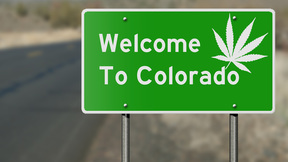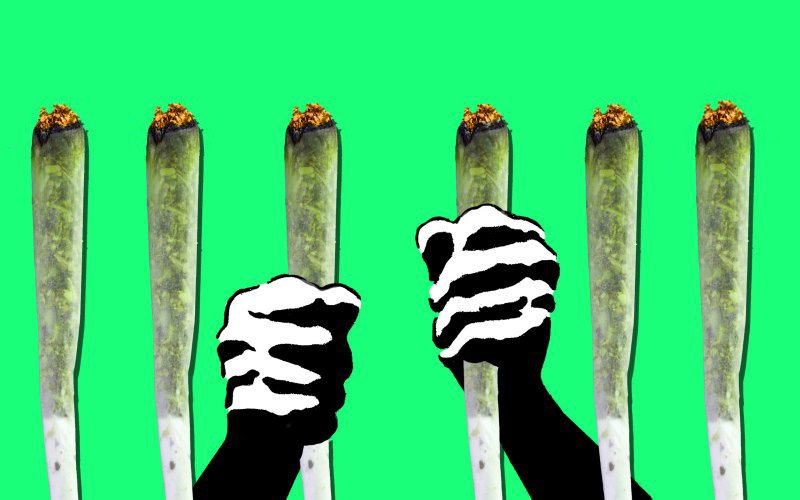"Although the legalization of marijuana seems pivotal for urban communities and those Who use it for medicinal purposes, it could actually become detrimental for small businessES and minority communities." -Elena Ruiz

With the election around the corner and the rising popularity of marijuana, the legalization of marijuana could be well on its way. On November 6th, Californians will be voting on Prop 64 which legalizes marijuana, allowing those 21 and over to sell and use for recreational purposes, with taxation and regulation. This is not the reality for everyone however, as drug-related convicts and those with marijuana offenses in California are not allowed a license and therefore will be limited to using marijuana illegally.

Colorado, Oregon, Washington, and Alaska have already legalized the recreational use of marijuana, while half of the United States now have laws on the books supporting a legal marijuana industry. Since it is an industry in its beginning stages, the majority of small businesses reap the benefits. According to the firm Arcview Market Research and their legal marijuana market documents, the marijuana industry hit an estimated 5.4 billion in sales in 2015. This is expected to grow at an annualized rate of about 30% through 2020.
Although the results of marijuana legalization seem positive now, it is almost inevitable that big business will take over the industry, whether it is legalized or not. Writer Sean Williams predicts that this process is probable to happen in three ways: legalization of marijuana as an illicit drug, marijuana being scheduled as a 2-5 substance, and marijuana being descheduled completely.
Although the results of marijuana legalization seem positive now, it is almost inevitable that big business will take over the industry, whether it is legalized or not. Writer Sean Williams predicts that this process is probable to happen in three ways: legalization of marijuana as an illicit drug, marijuana being scheduled as a 2-5 substance, and marijuana being descheduled completely.

If marijuana is considered a federally illicit substance, meaning it has no medical benefit, it will continue to be an issue dealt with by state. Federal legalization would no longer be an option. Businesses that make their income on marijuana sale, “will have to pay federal income tax on gross profits instead of net profits.” In simpler words, businesses will not be able to deduct normal business expenses from their taxes, leaving them overtaxed.
There’s also a problem concerning banks in relation to business. If a dispensary wants support financially or to put money in a bank for their business, the bank usually does not want any part of it, especially if marijuana were to remain illegal federally. Working with a cannabis business (that is essentially illegal) can be considered money laundering. This leaves small businesses to deal in cash and restricts their chances of expansion.
So where does big business come into play? Big corporations rely on their privilege of financial wealth to expand and employ, regardless of legalization. According to Fool.com, with their capital backing, corporations can open a “normal business” such as caregiving which will allow them to make normal business expense deductions. They will have the funds necessary to pay off whatever taxes come their way. Essentially, big business has the power to make marijuana a profitable source of revenue, even if it’s illegal.
Drug scheduling is a system that controlled substances undergo by the DEA that classify whether the drug has medical benefits, and can be used in medical treatment. This process also analyzes its addictiveness, and the potential physical dependence (drug withdrawal) it holds. If so, marijuana would be scheduled as a 2 substance, and considered to have medical benefits while still being highly addictive. This gives the pharmaceutical industry the opportunity to make a huge profit off of the legalization of marijuana. As the pharmaceutical industry does with other drugs, it will become almost impossible to possess marijuana without a prescription or health care, and extremely expensive. Imagine going to pick up marijuana at your local Walgreens.
If marijuana is descheduled, however, it will be considered no different than tobacco and alcohol. Yet this still comes with the same regulations that tobacco and alcohol businesses face, which can become limiting for small businesses with a lower income and no financial backing to uphold. This is also the most similar route to a free market for the cannabis industry. Allowing big business to sell more marijuana for lower prices due to their capital backing.
So either way, it’s complicated. If marijuana is legalized in California, this will actually benefit tax revenue while providing jobs--unless you’ve been convicted for a drug related crime, or marijuana offense. Which is even more complicated.
There’s also a problem concerning banks in relation to business. If a dispensary wants support financially or to put money in a bank for their business, the bank usually does not want any part of it, especially if marijuana were to remain illegal federally. Working with a cannabis business (that is essentially illegal) can be considered money laundering. This leaves small businesses to deal in cash and restricts their chances of expansion.
So where does big business come into play? Big corporations rely on their privilege of financial wealth to expand and employ, regardless of legalization. According to Fool.com, with their capital backing, corporations can open a “normal business” such as caregiving which will allow them to make normal business expense deductions. They will have the funds necessary to pay off whatever taxes come their way. Essentially, big business has the power to make marijuana a profitable source of revenue, even if it’s illegal.
Drug scheduling is a system that controlled substances undergo by the DEA that classify whether the drug has medical benefits, and can be used in medical treatment. This process also analyzes its addictiveness, and the potential physical dependence (drug withdrawal) it holds. If so, marijuana would be scheduled as a 2 substance, and considered to have medical benefits while still being highly addictive. This gives the pharmaceutical industry the opportunity to make a huge profit off of the legalization of marijuana. As the pharmaceutical industry does with other drugs, it will become almost impossible to possess marijuana without a prescription or health care, and extremely expensive. Imagine going to pick up marijuana at your local Walgreens.
If marijuana is descheduled, however, it will be considered no different than tobacco and alcohol. Yet this still comes with the same regulations that tobacco and alcohol businesses face, which can become limiting for small businesses with a lower income and no financial backing to uphold. This is also the most similar route to a free market for the cannabis industry. Allowing big business to sell more marijuana for lower prices due to their capital backing.
So either way, it’s complicated. If marijuana is legalized in California, this will actually benefit tax revenue while providing jobs--unless you’ve been convicted for a drug related crime, or marijuana offense. Which is even more complicated.
African Americans are four times as likely to be arrested for the possession of marijuana, even though Caucasians use it at the same rate. Latino people are equally mistreated. The SF Chronicle reported that in 2014, 39.5 % of Latinos were arrested for the possession of marijuana while 70% of total arrests for marijuana possession resulted in conviction. Yet with this election there is a window for those already serving sentences to be eligible for a resentencing, which isn’t promising, but brings hope for the future of those convicted.
Another hitch of the potential legalization is that the people who have been living off of the industry of the cannabis black market will not be able to participate in the industry once it becomes legal. In California it is allowed to deny those who have a felon for the illegal possession of marijuana for sale, manufacture, transportation, or cultivation of a controlled substance, and a license or card to enjoy marijuana for recreational use. Working, owning, investing, or sitting on the board of cannabis business is not allowed by convicts. It’s extremely hypocritical for an industry dominated by African American and Hispanic people to be denied access to partake in the industry once it becomes socially acceptable to do so. So who is the real criminal here?
Although extremely tricky and hard to find a solution to, it is evident that if marijuana is going to be legalized there needs to be some changes made to its proposition. Marijuana should stay in the hands of those that have dealt with it for many years and care about the plant as well as the profit, not solely the profit. So Californians, what’s the move?
Another hitch of the potential legalization is that the people who have been living off of the industry of the cannabis black market will not be able to participate in the industry once it becomes legal. In California it is allowed to deny those who have a felon for the illegal possession of marijuana for sale, manufacture, transportation, or cultivation of a controlled substance, and a license or card to enjoy marijuana for recreational use. Working, owning, investing, or sitting on the board of cannabis business is not allowed by convicts. It’s extremely hypocritical for an industry dominated by African American and Hispanic people to be denied access to partake in the industry once it becomes socially acceptable to do so. So who is the real criminal here?
Although extremely tricky and hard to find a solution to, it is evident that if marijuana is going to be legalized there needs to be some changes made to its proposition. Marijuana should stay in the hands of those that have dealt with it for many years and care about the plant as well as the profit, not solely the profit. So Californians, what’s the move?



